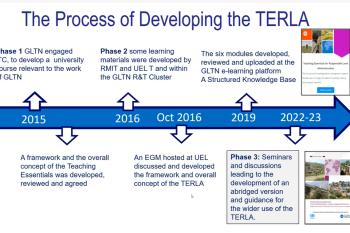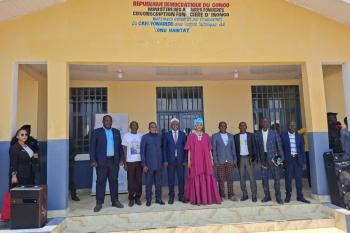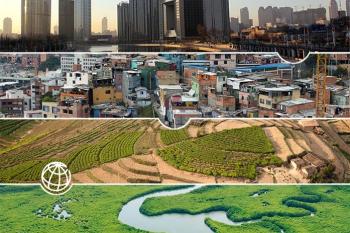
Netherlands Ambassador Presents First Certificates of Customary Ownership in Rubanda District, Uganda
On 23 September 2025 in Rubanda District, South-Western Uganda, H.E. Frederieke Quispel, the Ambassador of the Kingdom of the Netherlands to Uganda, joined the Rubanda District leadership to preside over the first issuance of Certificates of Customary Ownership (CCOs) under the Agricultural Governance Results Improvement Project (A-GRIP). A total of 202 CCOs were handed to small holder famers from the district. All certificates were printed and fully integrated into the National Land Information System, ensuring traceability and ease access of information later during land transactions. The beneficiaries included 222 joint owners, as well as 109 men and 49 women. This marked the first time customary landowners in Rubanda received officially recognized documentation of their land rights.
Since 2023, the Global Land Tool Network (GLTN), facilitated by UN-Habitat, has worked with Cordaid Uganda to implement the capacity-development component of A-GRIP in Kabale and Rubanda districts through Netherlands Enterprise Agency (RVO) managed LAND-at-Scale project. Through the LAND-at-Scale in Uganda project, UN-Habitat/GLTN and the Uganda Community Based Association for Women and Children’s Welfare (UCOBAC) have focused on strengthening the capacity of district and lower-level land management institutions to carry out customary land registration and facilitate the issuance of CCOs.
The ceremony brought together representatives from the Embassy of the Kingdom of the Netherlands, Cordaid Uganda, UN-Habitat/GLTN, UCOBAC, and officials from district and sub-county levels, alongside the CCO recipient landowners. The district authorities acknowledged the crucial role played by UN-Habitat/GLTN and UCOBAC in building the technical capacity of local land administration institutions. District leaders emphasized that without this institutional strengthening, the customary registration process and subsequent issuance of CCOs would have been far more difficult to achieve.
The Chief Administrative Officer, Mr. Ahabwe Samuel, remarked: “As we all know, land is the backbone of our economy. It is where our farmers cultivate crops, where families build their homes, and where communities thrive. By providing clear and secure land ownership through customary certificates, we are empowering our farmers to invest in their land with confidence. This security will encourage them to adopt better agricultural practices, invest in modern farming techniques, and ultimately increase their yields.” He added that the initiative is also vital for women’s empowerment: “In many cases, women have been marginalized in land ownership. By ensuring that women have access to these certificates, we are not only promoting gender equality but also enhancing the economic stability of families. Empowered women contribute significantly to the well-being of their households and communities.”
Looking ahead, the project partners and district authorities committed to extending these gains to additional sub-counties in Rubanda District. By applying lessons learned and leveraging stronger local institutions, the initiative aims to reach more smallholder farmer households, enhance land tenure security, and contribute to broader goals of improved land governance and agricultural development in Uganda.


